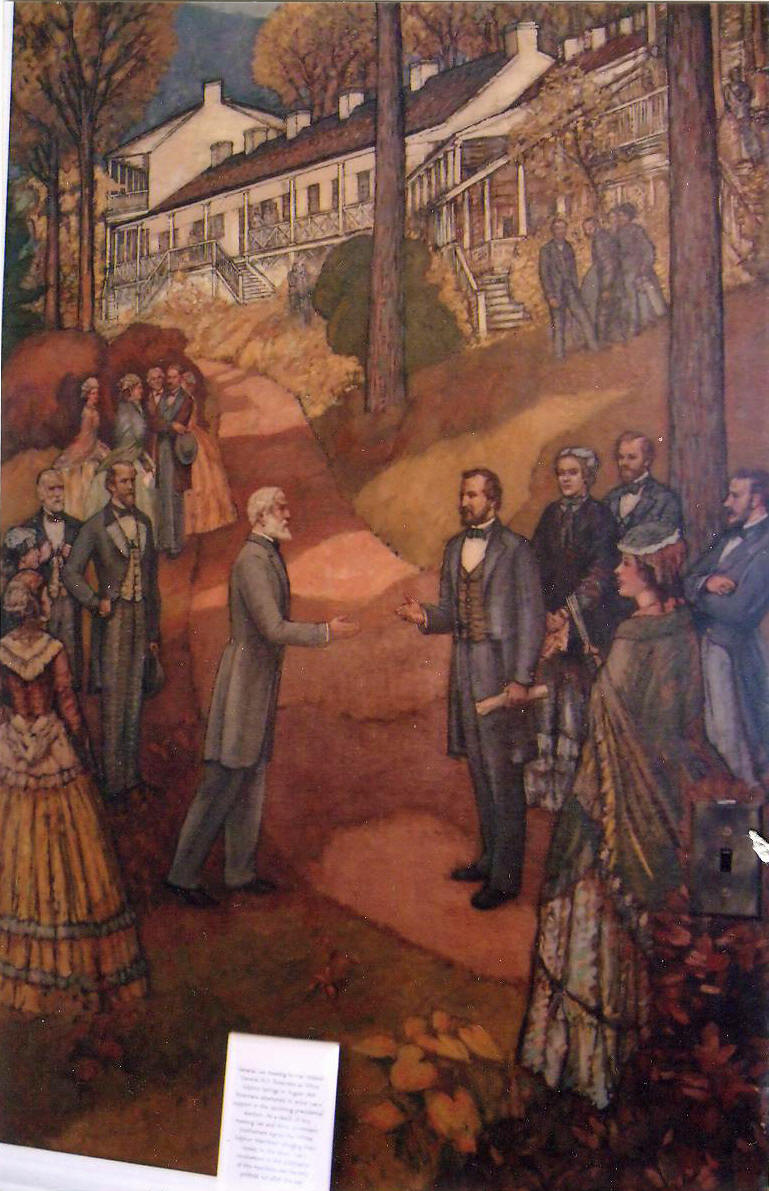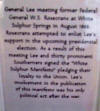Full Text of Article:
The conference of Gen. Rosecrans with Gen. R. E. Lee and
other distinguished Southern men at the White Sulphur Springs
has excited interest in all parts of the country, and the public
have manifested a feverish anxiety to learn the character of the
correspondence which took place between the parties. The letter
of Gen. Rosecrans is long, and we have not the space to publish
it in this issue, but we give below the reply of Gen. Lee and
others which will enable the reader to learn the substance of
it. The whole people of the South, with possibly the exception
of mangy scallawags diseased with the leprosy of Radicalism,
will heartily endorse the able and patriotic letter of Gen. Lee
and the other distinguished men whose signatures are attached
thereto. The National Intelligencer denominates it a "masterly
letter," and says "it is a calm, judicious, pacific, earnest and
eminently paper." Here it is:
WHITE SULPHUR SPRINGS
WEST VA., August 26, 1868.
GENERAL -- I have had the honor to receive your letter of
this date, and in accordance with your suggestions I have
conferred with a number of gentlemen from the South in whose
judgment I have confided, and who are well acquainted with the
public sentiment of their respective States. They have kindly
consented to unite with me in replying to your communication,
and their names will be found with my own appended to this
answer. With this explanation, we proceed to give you a candid
statement of what we believe to be the sentiment of the Southern
people in regard to the subject to which you refer.
Whatever opinions may have prevailed in the past in regard to
African slavery, or the right of a State to secede from the
Union, we believe we express the almost unanimous judgment of
the Southern people when we declare that they consider that
those questions were decided by the war, and that it is their
intention in good faith to abide by that decision. At the close
of the war, the Southern people laid down their arms and sought
to resume their former relations with the United States
Government.-- Through their State Conventions they abolished
slavery and annulled their ordinances of secession, and they
returned to their peaceful pursuits with a sincere purpose to
fulfill all their duties under the Constitution of the United
States, which they had sworn to protect. If their action in
these particulars had been met in a spirit of frankness and
cordiality, we believe that ere this old irritations would have
passed away, and the wounds inflicted by the war would have been
in a great measure healed. As far as we are advised, the people
of the South entertain no unfriendly feeling towards the
government of the United States, but they complain that their
rights under the Constitution are withheld from them in the
administration thereof.
The idea that the Southern people are hostile to the negroes,
and would oppress them if it were in their power to do so, is
entirely unfounded. They have grown up in our midst, and we have
been accustomed from childhood to look upon them with kindness.
The change in the relations of the two races has brought no
change in our feeling towards them. They still constitute the
important part of our laboring population. Without their labor,
the lands of the South would be comparatively unproductive.
Without the employment which Southern agriculture provides they
would be destitute of the means of subsistence, and become
paupers, dependent on public bounty. Self-interest, even if
there were no higher motive, would therefore prompt the whites
of the South to extend to the negroes care and protection.
The important fact that the two races are, under existing
circumstances, necessary to each other is gradually becoming
apparent to both, and we believe that but for the influences
exerted to stir up the passions of the negroes that the two
races would soon adjust themselves on a basis of mutual kindness
and advantage.
It is true that the people of the South, together with the
people of the North and West, are, for obvious reasons, opposed
to any system of laws which will place the political power of
the country in the hands of the negro race. But this opposition
springs from no feelings of enmity, but from a deep seated
conviction that at present the negroes have neither the
intelligence nor other qualifications which are necessary to
make them safe depositories of political power. They would
inevitably become the victims of demagogues, who for selfish
purposes would mislead them, to the serious injury of the
public.
The great want of the South is peace. The people earnestly
desire tranquility and the restoration of the Union. They
deprecate disorder and excitement as the most serious obstacle
to their prosperity. They ask a restoration of their rights
under the Constitution. They desire relief from oppressive
misrule. Above all, they would appeal to their countrymen for
the re-establishment in the Southern States of that which has
justly been the right of every American -- the right of
self-government. Establish these on a firm basis, and we can
safely promise on behalf of the Southern people that they will
faithfully obey the Constitution and laws of the United States,
treat the negro with kindness and humanity, and fulfill every
duty incumbent on peaceful citizens loyal to the Constitution of
the country.
We believe the above contains a succinct reply to the general
topics embraced in your letter, and we venture to say on behalf
of the Southern people and of the officers and soldiers of the
late Confederate army, that they will concur in all the
sentiments which we have expressed.
Appreciating the patriotic motives which have prompted your
letter, and reciprocating your expressions of kind regard, we
have the honor to be,
Very respectfully and truly,
R. E. Lee, of Va.,
W. J. Green, N.C.,
G. T. Beauregard, La.,
Lewis E. Harvie, Va.
Alex. H. Stephens, Ga.,
P. V. Daniel Jr., Va.
C. M. Conrad, La.,
W.T. Sutherlin, Va.
Linton Stephens, Ga.,
A. B. James, La.,
A. T. Caperton, W. Va.,
T. Beauregard, Texas,
John Echols, Va.,
M. O. H. Norton, La.,
F. S. Stockdale, Texas,
T. P. Branch, Ga.,
Jos. R. Anderson, Va.,
Jeremiah Morton, Va.
W. T. Turner, W. Va.,
John B. Baldwin, Va.
C. H. Suber, S. C., Geo. W. Bolling, Va.
E. Fontaine, Va.,
Theo. Flourney, Va.,
John Letcher, V.,
James Lyons, Va.
B. C. Adams, Miss.,
To Gen. W. S. Rosecrans, Minister to Mexico.
White Springs, Va.

